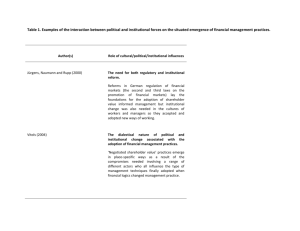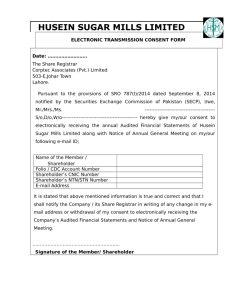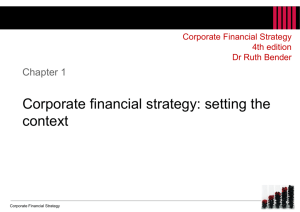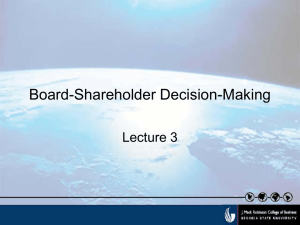pdf file
advertisement
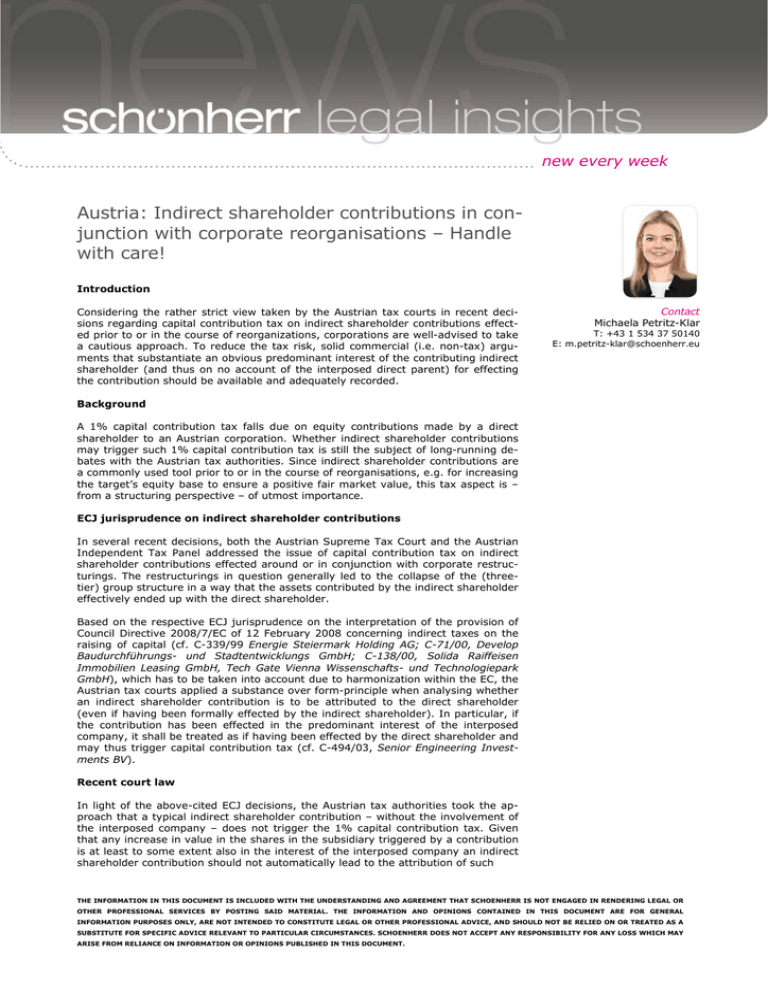
new every week Austria: Indirect shareholder contributions in conjunction with corporate reorganisations – Handle with care! Introduction Considering the rather strict view taken by the Austrian tax courts in recent decisions regarding capital contribution tax on indirect shareholder contributions effected prior to or in the course of reorganizations, corporations are well-advised to take a cautious approach. To reduce the tax risk, solid commercial (i.e. non-tax) arguments that substantiate an obvious predominant interest of the contributing indirect shareholder (and thus on no account of the interposed direct parent) for effecting the contribution should be available and adequately recorded. Contact Michaela Petritz-Klar T: +43 1 534 37 50140 E: m.petritz-klar@schoenherr.eu Background A 1% capital contribution tax falls due on equity contributions made by a direct shareholder to an Austrian corporation. Whether indirect shareholder contributions may trigger such 1% capital contribution tax is still the subject of long-running debates with the Austrian tax authorities. Since indirect shareholder contributions are a commonly used tool prior to or in the course of reorganisations, e.g. for increasing the target’s equity base to ensure a positive fair market value, this tax aspect is – from a structuring perspective – of utmost importance. ECJ jurisprudence on indirect shareholder contributions In several recent decisions, both the Austrian Supreme Tax Court and the Austrian Independent Tax Panel addressed the issue of capital contribution tax on indirect shareholder contributions effected around or in conjunction with corporate restructurings. The restructurings in question generally led to the collapse of the (threetier) group structure in a way that the assets contributed by the indirect shareholder effectively ended up with the direct shareholder. Based on the respective ECJ jurisprudence on the interpretation of the provision of Council Directive 2008/7/EC of 12 February 2008 concerning indirect taxes on the raising of capital (cf. C-339/99 Energie Steiermark Holding AG; C-71/00, Develop Baudurchführungs- und Stadtentwicklungs GmbH; C-138/00, Solida Raiffeisen Immobilien Leasing GmbH, Tech Gate Vienna Wissenschafts- und Technologiepark GmbH), which has to be taken into account due to harmonization within the EC, the Austrian tax courts applied a substance over form-principle when analysing whether an indirect shareholder contribution is to be attributed to the direct shareholder (even if having been formally effected by the indirect shareholder). In particular, if the contribution has been effected in the predominant interest of the interposed company, it shall be treated as if having been effected by the direct shareholder and may thus trigger capital contribution tax (cf. C-494/03, Senior Engineering Investments BV). Recent court law In light of the above-cited ECJ decisions, the Austrian tax authorities took the approach that a typical indirect shareholder contribution – without the involvement of the interposed company – does not trigger the 1% capital contribution tax. Given that any increase in value in the shares in the subsidiary triggered by a contribution is at least to some extent also in the interest of the interposed company an indirect shareholder contribution should not automatically lead to the attribution of such THE INFORMATION IN THIS DOCUMENT IS INCLUDED WITH THE UNDERSTANDING AND AGREEMENT THAT SCHOENHERR IS NOT ENGAGED IN RENDERING LEGAL OR OTHER PROFESSIONAL SERVICES BY POSTING SAID MATERIAL. THE INFORMATION AND OPINIONS CONTAINED IN THIS DOCUMENT ARE FOR GENERAL INFORMATION PURPOSES ONLY, ARE NOT INTENDED TO CONSTITUTE LEGAL OR OTHER PROFESSIONAL ADVICE, AND SHOULD NOT BE RELIED ON OR TREATED AS A SUBSTITUTE FOR SPECIFIC ADVICE RELEVANT TO PARTICULAR CIRCUMSTANCES. SCHOENHERR DOES NOT ACCEPT ANY RESPONSIBILITY FOR ANY LOSS WHICH MAY ARISE FROM RELIANCE ON INFORMATION OR OPINIONS PUBLISHED IN THIS DOCUMENT. new every week contribution to the direct shareholder thereby being subject to the 1% capital contribution tax. Only a particular, almost exclusive interest of the direct shareholder in the contribution should be of relevance here. The courts took the view that an indirect shareholder contribution effected shortly prior to or in conjunction with a corporate reorganization may indicate a nexus between the contribution and the reorganization which effectively leads to an ultimate benefit for the direct shareholder. If, in addition, other rather obvious facts, such as an apparent need of capital or an obligatory debt/equity ratio on the level of the interposed company, are eventually accomplished by effecting the reorganization (e.g. as a result of the reorganization the assets contributed eventually end up on the level of the direct parent company), then these facts may emphasize the outstanding interest of the interposed company in the contribution. Such interest may lead to attributing the formal indirect shareholder contribution to the direct shareholder for capital contribution tax purposes. In some of the cases decided by the courts, even valid commercial (i.e. non-tax) arguments for effecting the contribution, e.g. ensuring a positive fair market value of the entities concerned or avoiding a prohibited repayment of capital on the level of the transferring entity, did not prevent the 1% capital contribution tax from falling due. THE INFORMATION IN THIS DOCUMENT IS INCLUDED WITH THE UNDERSTANDING AND AGREEMENT THAT SCHOENHERR IS NOT ENGAGED IN RENDERING LEGAL OR OTHER PROFESSIONAL SERVICES BY POSTING SAID MATERIAL. THE INFORMATION AND OPINIONS CONTAINED IN THIS DOCUMENT ARE FOR GENERAL INFORMATION PURPOSES ONLY, ARE NOT INTENDED TO CONSTITUTE LEGAL OR OTHER PROFESSIONAL ADVICE, AND SHOULD NOT BE RELIED ON OR TREATED AS A SUBSTITUTE FOR SPECIFIC ADVICE RELEVANT TO PARTICULAR CIRCUMSTANCES. SCHOENHERR DOES NOT ACCEPT ANY RESPONSIBILITY FOR ANY LOSS WHICH MAY ARISE FROM RELIANCE ON INFORMATION OR OPINIONS PUBLISHED IN THIS DOCUMENT.

